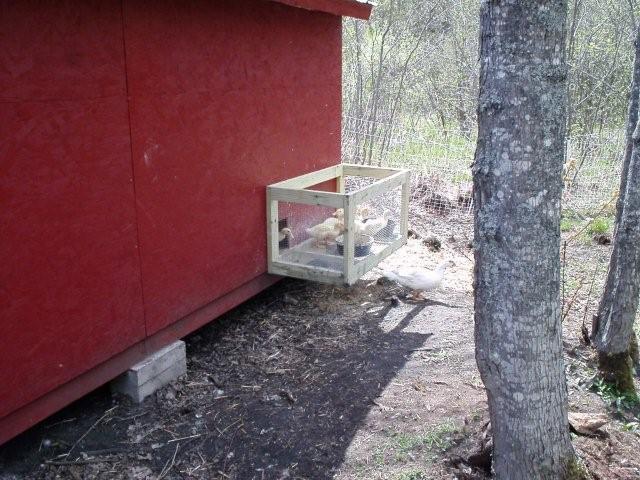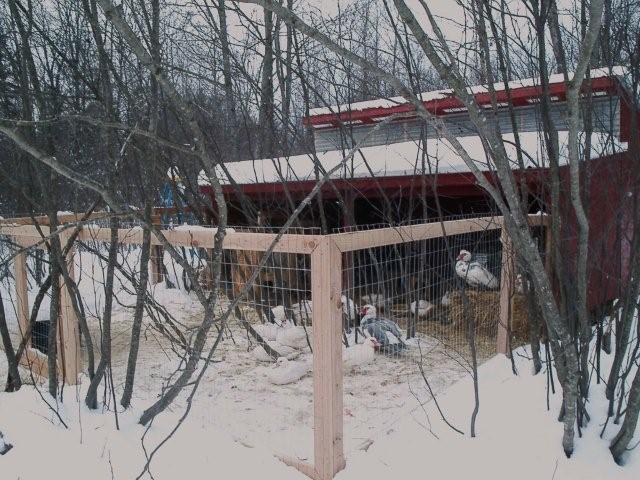Are they on wire mesh?
Navigation
Install the app
How to install the app on iOS
Follow along with the video below to see how to install our site as a web app on your home screen.
Note: This feature may not be available in some browsers.
More options
You are using an out of date browser. It may not display this or other websites correctly.
You should upgrade or use an alternative browser.
You should upgrade or use an alternative browser.
thoughts on this duck pen?
- Thread starter lisamarie
- Start date
- Thread starter
- #12
yes on hardware cloth. i know ducks don't roost like chickens so do you think this would be safe? if it's a tight mesh, could a predator still hurt them or get to them in any way from underneath through the mesh?
lisa
lisa
Quote:
Yes that could happen, but my concern would be for their feet. We only use wire flooring in the feeding stations. Due to our concern for the animals health and safety by minimizing abrasive surfaces and maintaining a clean environment, we have never had a case of bumblefoot in our flock of 50 adult ducks.
From http://www.duckhealth.com/housmngt.html
Flooring for ducks
Duck keepers should avoid flooring that will injure the skin covering the feet and hock joints of ducks. The smooth skin of ducks is not as tough (not as cornified) as that of land fowl, and is more susceptible to injury when ducks are confined on surfaces that are too rough, or abrasive. Slats, wire floors or cage bottoms may cause injury to the feet and legs of ducks, unless these surfaces are smooth, non-abrasive, and free of sharp edges. Stones, mixed with the soil covering the duck yards can also cause injury. The detrimental effect of flooring on ducks increases with the age and size of the duck, and the longer ducks are confined to the flooring. The likelihood of injury is greatly reduced if wire occupies no more one-fourth to one-third of the floor area. Properly constructed wire floors are usually a better choice than slats, which can cause leg deformities as well as injury to skin. If wire floors are used, floors for ducklings under 3 weeks should be constructed of 1.9 cm (3/4 inch) mesh, 12-gauge welded wire, attached to a frame designed to keep the wire flat, and minimize manure accumulation. For ducks over 3 weeks, 2.5 cm (1 inch) mesh is best. Vinyl coated wire is preferable, but smooth galvanized wire is satisfactory.
Yes that could happen, but my concern would be for their feet. We only use wire flooring in the feeding stations. Due to our concern for the animals health and safety by minimizing abrasive surfaces and maintaining a clean environment, we have never had a case of bumblefoot in our flock of 50 adult ducks.
From http://www.duckhealth.com/housmngt.html
Flooring for ducks
Duck keepers should avoid flooring that will injure the skin covering the feet and hock joints of ducks. The smooth skin of ducks is not as tough (not as cornified) as that of land fowl, and is more susceptible to injury when ducks are confined on surfaces that are too rough, or abrasive. Slats, wire floors or cage bottoms may cause injury to the feet and legs of ducks, unless these surfaces are smooth, non-abrasive, and free of sharp edges. Stones, mixed with the soil covering the duck yards can also cause injury. The detrimental effect of flooring on ducks increases with the age and size of the duck, and the longer ducks are confined to the flooring. The likelihood of injury is greatly reduced if wire occupies no more one-fourth to one-third of the floor area. Properly constructed wire floors are usually a better choice than slats, which can cause leg deformities as well as injury to skin. If wire floors are used, floors for ducklings under 3 weeks should be constructed of 1.9 cm (3/4 inch) mesh, 12-gauge welded wire, attached to a frame designed to keep the wire flat, and minimize manure accumulation. For ducks over 3 weeks, 2.5 cm (1 inch) mesh is best. Vinyl coated wire is preferable, but smooth galvanized wire is satisfactory.
- Thread starter
- #14
so what do you think about using the wire if it's only for sleeping at night? and i would cover it w/ straw?
what are my other options for flooring in a duck pen? i plan on housing them in there in the evenings and they will free range during the day w/ my chickens. should i just use wood and then cover w/ straw?
thanks so much!
what are my other options for flooring in a duck pen? i plan on housing them in there in the evenings and they will free range during the day w/ my chickens. should i just use wood and then cover w/ straw?
thanks so much!
Quote:
The key is to minimize abrasive surfaces, and thus it would seem that wire covered over with straw would be adequate. Another concern is that it can get quite cold at night in northern California in the winter, and the drafts from the wire flooring might be harmful to the ducks.
Our floors are either pressure treated plywood covered with straw, or dirt. In our situation, though, the floor needs to be able to take the weight of a human being.
The key is to minimize abrasive surfaces, and thus it would seem that wire covered over with straw would be adequate. Another concern is that it can get quite cold at night in northern California in the winter, and the drafts from the wire flooring might be harmful to the ducks.
Our floors are either pressure treated plywood covered with straw, or dirt. In our situation, though, the floor needs to be able to take the weight of a human being.
- Thread starter
- #16
so how do you best keep the floors clean if you are using wood flooring? cover w/ a pretty thick layer of straw and then do you do a deep litter method or clean out the pen regularly.
maybe i could keep 1/2 covered w/ plywood for sleeping and then another part w/ the the wire where i could keep their food and water? i want to keep their food and water in the coop because i want to keep my goats out of the duck feed. so is it possible to keep the food and water in the duck coop w/out making a major mess?
thanks so much!
maybe i could keep 1/2 covered w/ plywood for sleeping and then another part w/ the the wire where i could keep their food and water? i want to keep their food and water in the coop because i want to keep my goats out of the duck feed. so is it possible to keep the food and water in the duck coop w/out making a major mess?
thanks so much!
Quote:
Yes, we throw on more fresh straw until it builds up enough that it needs to be mucked out. We tried feeding/watering them on straw and it was a disaster. The ammonia smell was overpowering. Your idea of half plywood and half wire is in line with Cornell's recommendations.
This is one of our feeding stations off the coop.

We also feed the ducks on a dirt floor that is in a three sided shed built off the coop.

This way the straw bed inside the coop remains as dry as practically possible.
Yes, we throw on more fresh straw until it builds up enough that it needs to be mucked out. We tried feeding/watering them on straw and it was a disaster. The ammonia smell was overpowering. Your idea of half plywood and half wire is in line with Cornell's recommendations.
This is one of our feeding stations off the coop.

We also feed the ducks on a dirt floor that is in a three sided shed built off the coop.

This way the straw bed inside the coop remains as dry as practically possible.
- Thread starter
- #18
what an awesome set up! i love the idea of the feeding station! thank you so much for sharing the photos.
lisa
lisa
Similar threads
New posts New threads Active threads
-
Threads with more replies in the last 15 days
-
-
Question of the Day - Friday, February 13th, 2026
- Started by casportpony
- Replies: 93
-
-
-
-
×
